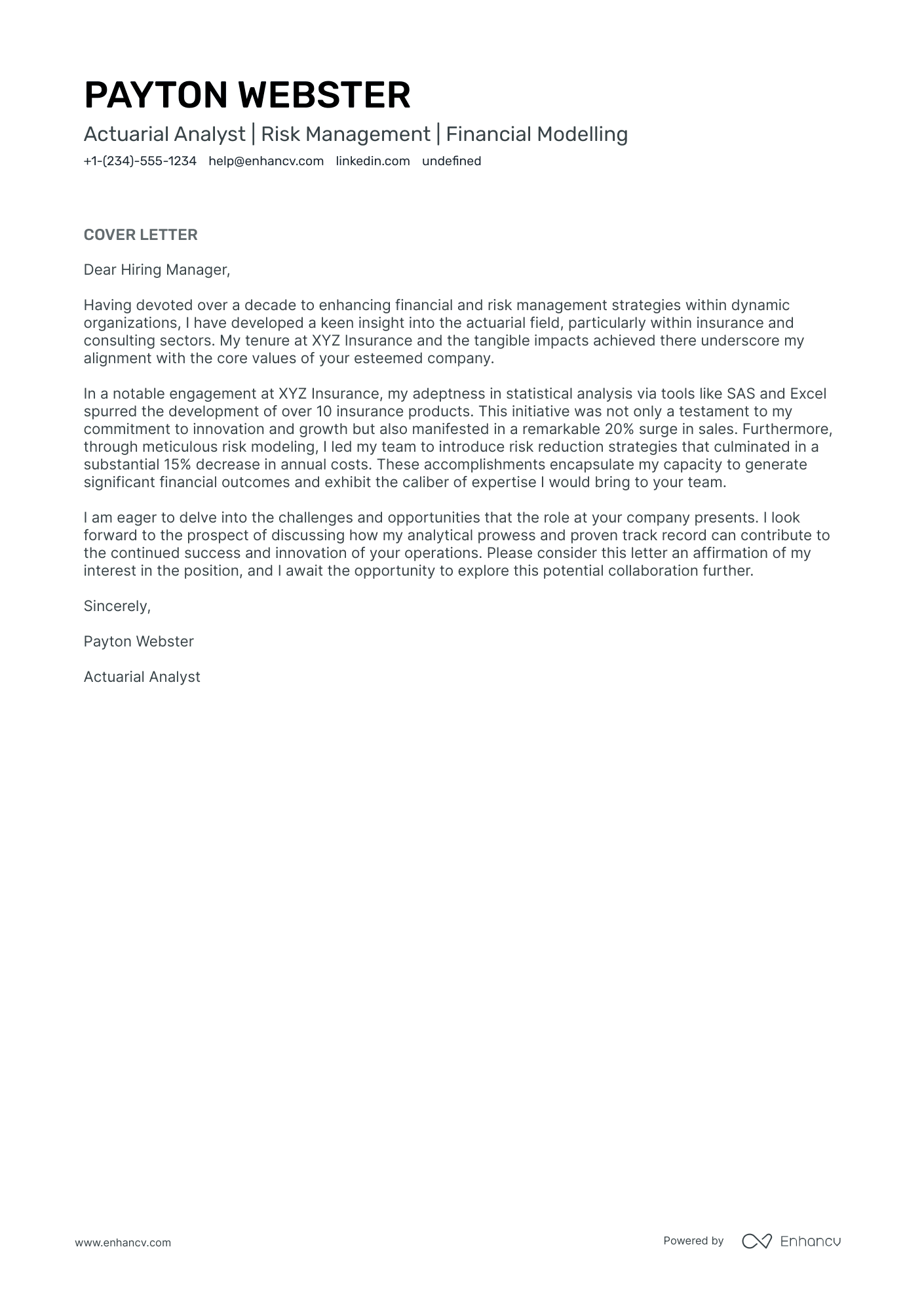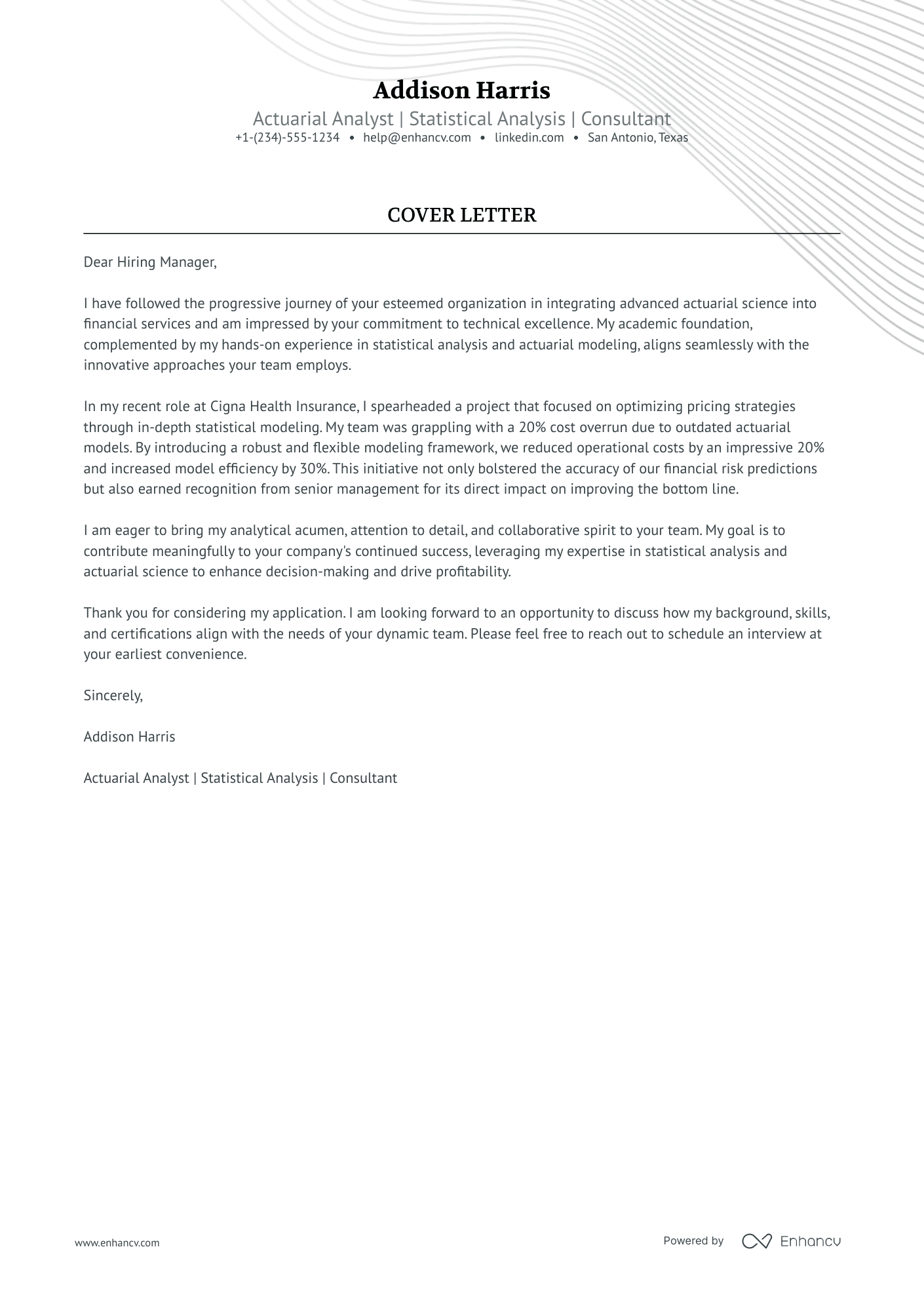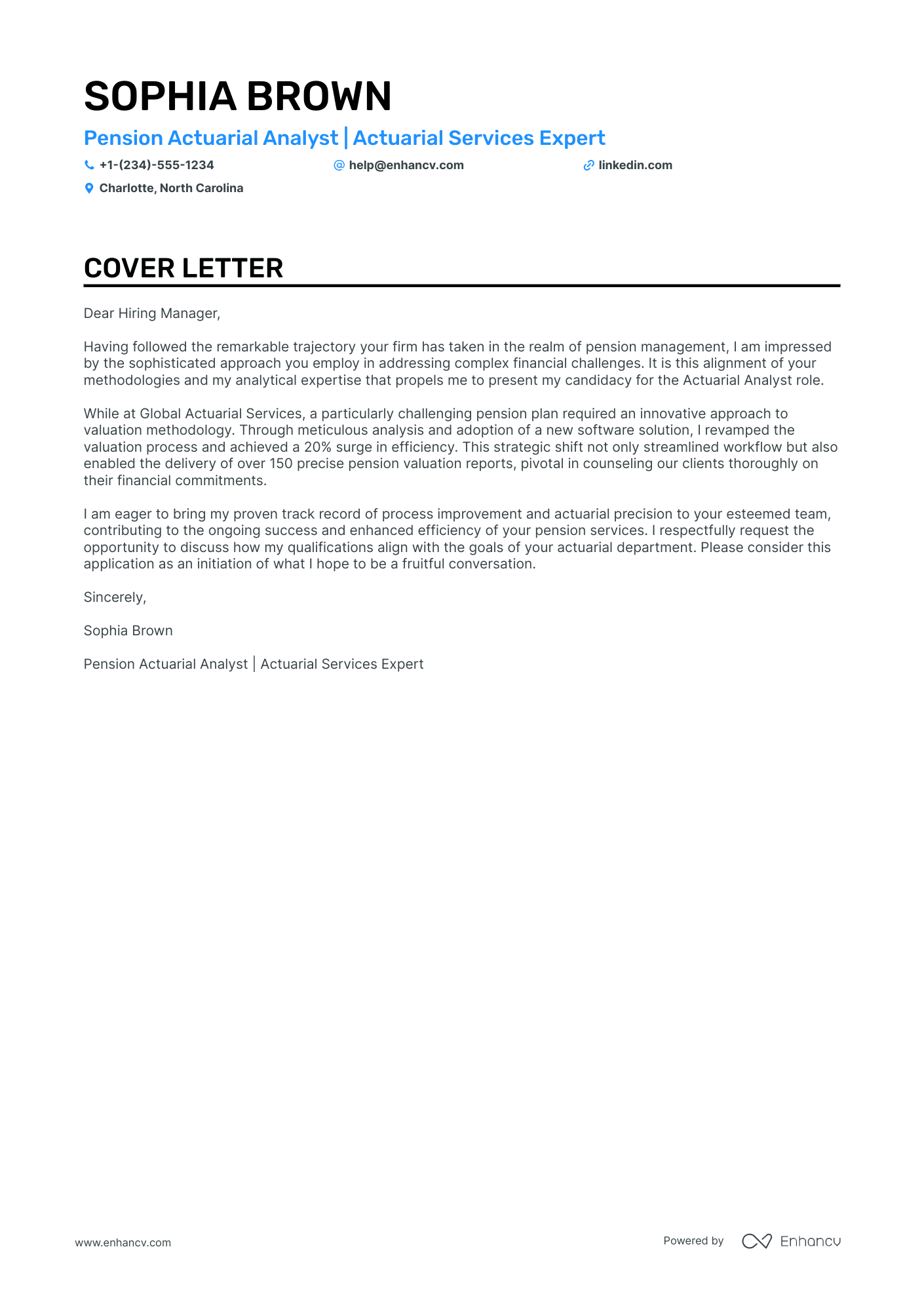Embarking on your actuarial career, you've likely hit the common snag of crafting the perfect cover letter. While your resume showcases your credentials, your cover letter should be a narrative of your proudest professional achievement, not a repeat of your resume. It's about striking a balance between formal tone and originality, steering clear of tired clichés. Remember, brevity is key—your compelling story must captivate in just one page. Let's dive into how you can make that happen.
- Making excellent use of job-winning real-life professional cover letters;
- Writing the first paragraphs of your actuary cover letter to get attention and connect with the recruiters - immediately;
- Single out your most noteworthy achievement (even if it's outside your career);
- Get a better understanding of what you must include in your actuary cover letter to land the job.
Let the power of Enhancv's AI work for you: create your actuary cover letter by uploading your resume.
If the actuary isn't exactly the one you're looking for we have a plethora of cover letter examples for jobs like this one:
Drop your resume here or choose a file.
PDF & DOCX only. Max 2MB file size.
Actuary cover letter example
Alexander Taylor
New York City, New York
+1-(234)-555-1234
help@enhancv.com
- Relevant Experience: The letter mentions the candidate's tenure at MetLife and a specific project that showcases experience directly relevant to the role, emphasizing their capacity to revamp risk evaluation models.
- Quantifiable Achievements: It highlights a significant accomplishment (20% reduction in forecast errors), which demonstrates the candidate's ability to deliver measurable results, a key aspect in actuarial and risk assessment positions.
- Technical Skillset: The cover letter references expertise in predictive analytics and advanced statistical techniques, showing the candidate's technical competency, which is essential for an actuarial role that depends heavily on data analysis.
- Leadership and Teamwork: It showcases the candidate's leadership experience by mentioning the successful management of a team and the collaborative nature of their work, essential skills for a senior position where leadership is expected.
Five tips on formatting your actuary cover letter
Do you want to make a good impression on recruiters and, at the same time, follow the best industry advice on writing your actuary cover letter?
Make sure to include the following:
- Header and Salutation;
- Introductory paragraph;
- Body paragraph;
- Closing paragraph;
- Signature (this one is up to you).
Remember to use the same modern, simple font for your actuary cover letter as you did for your resume (e.g. Lato, Rubik, etc.)
Ensure your actuary cover letter is single-spaced and is wrapped around a one-inch margin, like in our cover letter templates.
Once completed, use our cover letter builder to export your actuary cover letter in the best format to keep your information intact - PDF.
At the end of the day, your actuary cover letter won't be assessed by the Applicant Tracker System (ATS) software, but by the recruiters. Your information should thus be legible, organized, and follow a structured logic.
Need a cover letter, but short on time? Use our free cover letter generator to create one from your resume in no time.
The top sections on a actuary cover letter
Header: This includes your contact information, the date, and the recipient's details, and it ensures your cover letter looks professional and is directed to the correct person or department.
Opening Greeting: A personalized salutation addresses the hiring manager by name and demonstrates your attention to detail and interest in establishing a personal connection.
Introduction: Introduce yourself by mentioning your actuarial qualifications and express your enthusiasm for the position, as it sets the tone and engages the reader from the start.
Professional Experience and Skills: Highlight specific instances of your analytical skills, risk assessment experience, and any relevant actuarial exams passed, as these are key competencies that recruiters look for in candidates for actuary roles.
Closing Section: Reiterate your interest in the role, summarize why you are a great fit, thank the recruiter for their time, and include a call to action such as looking forward to discussing your qualifications in further detail, which shows proactiveness and eagerness.
Key qualities recruiters search for in a candidate’s cover letter
Strong mathematical and statistical analysis skills: Actuaries use these skills to assess risk and the financial implications of uncertainty and to make predictions about future events.
Proficiency in actuarial software: Recruiters look for candidates familiar with relevant tools like Prophet, MoSes, or similar actuarial software to model and evaluate financial risks efficiently.
Knowledge of insurance and finance principles: A solid understanding of the insurance industry, finance, and economics allows actuaries to design, test, and manage insurance policies and pension plans.
Detail-oriented mindset: Attention to detail ensures accurate calculations, which is crucial in an actuary's role since small errors can lead to significant financial consequences.
Strong communication skills: Actuaries must clearly explain complex mathematical concepts to non-experts, including clients, managers, and other stakeholders.
Professional certification progress: Recruiters often look for candidates who have started or completed actuarial exams and are on the path to becoming an Associate or Fellow of recognized actuarial societies (e.g., Society of Actuaries or Casualty Actuarial Society).
Personalizing your actuary cover letter salutation
Always aim to address the recruiter from the get-go of your actuary cover letter.
Use:
- the friendly tone (e.g. "Dear Paul" or "Dear Caroline") - if you've previously chatted up with them on social media and are on a first-name basis;
- the formal tone (e.g. "Dear Ms. Gibbs" or "Dear Ms. Swift") - if you haven't had any previous conversation with them and have discovered the name of the recruiter on LinkedIn or the company website;
- the polite tone (e.g. "Dear Hiring Manager" or "Dear HR Team") - at all costs aim to avoid the "To whom it may concern" or "Dear Sir/Madam", as both greetings are very old-school and vague.
List of salutations you can use
- Dear Hiring Manager,
- Dear [Company Name] Team,
- Dear [Department Name] Recruiter,
- Dear Mr./Ms. [Last Name],
- Dear Members of the [Team Name] Team,
- Dear Recruitment Committee,
Your actuary cover letter intro: showing your interest in the role
On to the actual content of your actuary cover letter and the introductory paragraph.
The intro should be no more than two sentences long and presents you in the best light possible.
Use your actuary cover letter introduction to prove exactly what interests you in the role or organization. Is it the:
- Company culture;
- Growth opportunities;
- Projects and awards the team worked on/won in the past year;
- Specific technologies the department uses.
When writing your actuary cover letter intro, be precise and sound enthusiastic about the role.
Your introduction should hint to recruiters that you're excited about the opportunity and that you possess an array of soft skills, e.g. motivation, determination, work ethic, etc.
That one achievement in your actuary cover letter body
The lengthiest part of your actuary cover letter is the body.
Within the next three to six middle paragraphs, present yourself as the best candidate for the role.
How can you do that without retelling your whole professional resume?
Select one key achievement that covers job-crucial skills and technologies (and is memorable).
Within the body of your actuary cover letter, aim to tell the story of how you achieved your success. Also, write about how this would help out your potential team.
Thinking about the closing paragraph of your actuary cover letter
Before your signature, you have extra space to close off your actuary cover letter.
Use it to either make a promise or look to the future.
Remind recruiters how invaluable of a candidate you are by showing what you plan to achieve in the role.
Also, note your availability for a potential next meeting (in person or over the telephone).
By showing recruiters that you're thinking about the future, you'd come off as both interested in the opportunity and responsible.
Is it beneficial to mention that you have no experience in your actuary cover letter?
Lacking professional experience isn't the end of the world for your actuary cover letter.
Just be honest that you may not have had roles in the industry, but bring about so much more.
Like, your transferable skills, attained thanks to your whole work and life experience (e.g. the skills your summer spent working abroad taught you).
Or, focus on what makes you, you, and that one past success that can help you stand out and impress recruiters (think of awards you've attained and how they've helped you become a better professional).
Alternatively, write about your passion and drive to land the job and the unique skill set you would bring to enhance the workplace culture.
Key takeaways
Winning at your job application game starts with a clear and concise actuary cover letter that:
- Has single-spaced paragraphs, is wrapped in a one-inch margin, and uses the same font as the actuary resume;
- Is personalized to the recruiter (using their name in the greeting) and the role (focusing on your one key achievement that answers job requirements);
- Includes an introduction that helps you stand out and show what value you'd bring to the company;
- Substitutes your lack of experience with an outside-of-work success, that has taught you valuable skills;
- Ends with a call for follow-up or hints at how you'd improve the organization, team, or role.
Actuary cover letter examples
By Experience
Actuary Internship
Experienced Actuary
By Role







